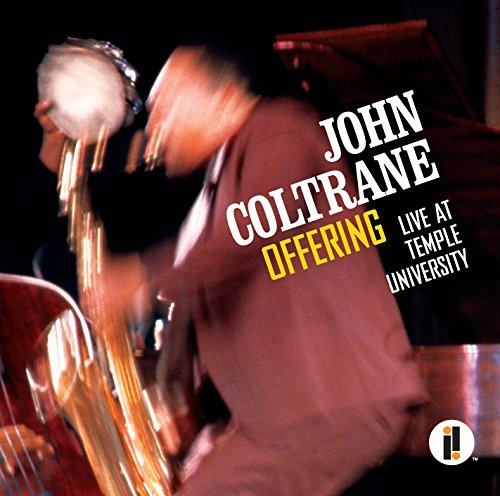
John Coltrane
Offering: Live at Temple University
Release Date: Sep 23, 2014
Genre(s): Jazz, Jazz Instrument, Post-Bop, Avant-Garde Jazz, Modal Music, Saxophone Jazz, Free Jazz
Record label: Universal Music
Music Critic Score
How the Music Critic Score works
Buy Offering: Live at Temple University from Amazon
Album Review: Offering: Live at Temple University by John Coltrane
Exceptionally Good, Based on 5 Critics
Based on rating 9/10
Recorded eight months before his death from liver cancer, the concert album Offering: Live at Temple University features legendary jazz saxophonist John Coltrane performing with his quintet in his hometown of Philadelphia on November 11, 1966. Although it's been available in various incomplete bootleg forms over the years, Resonance's Offering is the first official, complete, and fully mastered version to be released. Produced from a set of long-lost master tapes rediscovered by Coltrane's son, saxophonist Ravi Coltrane, Offering showcases the late jazz innovator's final ensemble featuring his wife, keyboardist Alice Coltrane, saxophonist Pharoah Sanders, bassist Sonny Johnson (sitting in for Jimmy Garrison), drummer Rashied Ali, and a coterie of local guest musicians.
Based on rating 8.5/10
The last eight years of John Coltrane's life were a period of astonishing creativity. In 1960, he was leaving Miles Davis' group after a stint during which it was widely understood to be among the greatest jazz units of all time. In 1967, he was at the leading edge of free jazz, creating abstract and unbelievably intense music that left the mainstream far behind.
Based on rating 4/5
In late 1966, months before he died, jazz’s greatest saxophonist played a sparsely attended college show, joined by wife Alice Coltrane on piano, Pharoah Sanders on blitzing tenor and time-bending drummer Rashied Ali. This full recording of the long-bootlegged set is a jazz grail: no tunes, just a sonic storming of the heavens (see “Leo”). It’s the sound of longing unbound.
Opinion: Absolutly essential
The two-disc "Offering" practically begins mid-sentence, with John Coltrane already into the opening number "Naima" before the engineer for Temple University's WRTI radio station could hit the "record" button. Just nine months away from his death of liver cancer in 1967, Coltrane was still a step ahead. Here, in a sprawling and rapturous concert during Coltrane's divisive late period, he set aside his "classic quartet" for fiery and expressive free playing, setting a new course for avant-garde jazz.
Opinion: Excellent
Even as someone who routinely writes about "difficult" music, words often fail me when it comes to John Coltrane. I'm undoubtedly not alone: Beatles and Dylan aside, essentially nobody has had a more sweeping cross-cultural influence on music as a whole in the last 70 years than Coltrane, and the difference between he and his aforementioned peers (I use the term loosely) is that the masses are still trying to make sense of what Coltrane was on about in his final years on this plane. To deep listeners, records like Interstellar Space, Om, and Ascension may resonate as the next sensible step for their time, but to a big chunk of music fans (including many self-professed Trane fans) they're just a lot of noise.
'Offering: Live at Temple University'
is available now

